|
As Christian parents, teachers, or grandparents, we know the importance of a Christian worldview, and part of this is helping children and teens understand how to write as Christians. As children grow in their skills of writing, we hope for them to love Jesus. Blog posts on newSongpress.net give tips and advice to further young authors and writers in their writing, so that they can also grow in their abilities to write as Christians. When teaching children and teens writing, please honor prewriting. Too often children and teens are rushed to the “high board” by over-eager, short-on-time, teachers and parents, and expected to jump into a writing assignment with little preparation for the topic. Letting students doodle briefly before writing, while you pray they are staying on topic, is not enough. 1. Enrich with Personal Experiences Recently, I was involved in a town history day where children created sand paintings based on historical photos from the heyday when trollies zipped through our towns and hilly countryside. I can’t say the results of their artwork would have been much improved if their parents first took them to the nearby trolley museum or popped them on a restored trolley for a jolly ride. However, certainly the project would have taken on a great deal more meaning for the children if they first were enriched by personal experiences with the project theme. Let’s Hear Their Voices When it comes to writing, we are much more likely to hear the yearned for young writers’ voices, if they have a “dog in the fight.” We want our writers to be engaged and care about their writing topics. Let’s give them lots of opportunity to become empowered before they write. Don’t we all write better when we know a great deal about our subject? What Does This Look Like? We all know we live in an age of TMI--too much information. Young writers can also get overwhelmed if they are given too much information as they learn about a topic. An adage to authors is--write about what you know. 2. Begin prewriting with introducing the topic and then let the students think about what they understand and know about the topic. Encourage them to make a chart or list of keywords and memorable experiences they recall about the topic. They could draw a web outline, with the main topic as the center circle and connecting smaller ovals with keywords. Sometimes this is called mapping. 3. Let them talk about the topic. Here might be a great time for you, as the teacher, to note students’ working vocabulary for this topic and make some fun and creative side lessons to expand students’ vocabulary for this writing unit. How about having several new words of the day and cheering for students when they apply them in their conversations? If you are in a group setting, this can become a team competition. Create acrostics and crossword puzzles with the new words. Give them extra credit points or rewards for correctly using these words in their journal writing. (Click here for more ideas on word games to help young writers build their vocabulary.) Learning how to write as Christians includes learning Bible related words. For instance, I have seen teachers ask children if they have any prayer requests, and then get puzzled looks by unchurched children who then ask, What is a prayer request? Even with our own children, we should check they have a kid-friendly understanding of Christian related words. 4. Brainstorm Next, challenge them to talk about and write questions they have regarding the topic. Then, brainstorm ways they can learn more in the areas that interest them. Interview a neighbor? Watch some YouTube videos? Here’s a great opportunity to read both fiction and nonfiction articles and books that enrich their understanding of the topic. It may include family read alouds and audiobooks, too. 5. Keep Research Journals Encourage young writers to keep a daily record of their findings and questions. A spiral notebook is sufficient, but digital apps such as Notes on a cell phone can work well too. Prewriting is such an important stage of writing and as teachers, including homeschool teachers, interact with your students about their entries. Use this as a springboard to create more dialogue, because the more the topic is verbalized, chances are the easier it will be for children to write the desired assignment. 6. Bump It Up Heavenward Imagine rushing to a water fountain when your whole insides shout for water. As soon as you drink the cold water you feel refreshed. Here’s the challenge. If your goal is also to help youth write with the importance of a Christian worldview, how can you help them have a thirst for Jesus, who is the Living Water, at least as keenly as they have for cold, refreshing water from a water fountain? To top it off, how can they take this fervent faith into the topic which they are preparing to write about? As they share with you the information and stories they are discovering in their research, find the poignant moments to ask questions such as--What does the Bible teach us about this? Do you remember a time in (specific Bible lesson) that (for example, King David) experienced this? What do you think Jesus would do? What do you imagine His disciples might think? What do you think God is wanting you to learn from your research? Give students a chance to reflect on these questions and verbalize their thoughts. Then encourage them to add their ideas into their journals, to save them for working into their writing assignments. Remember what I said about writer’s voice? We need to be so careful here that children and teens know they can write about their faith in a genuine way, and not fall in the trap of writing because it sounds good and religious. The last thing we want to do is encourage them in phony faith growth. Recently, I was talking with a small group of kindergartners about God knowing our hearts. One little girl piped up, “Of course He does. Jesus is in my heart.” Now that’s the joyous voice fresh from a young person’s perspective! 7. Make Scribble Pads Handy As to notebooks, your students may each love having a pocket-size notebook, in addition to a larger one, perhaps even ones they make, but certainly ones in which they can personalize the covers. If you write, even emails or texts, then you know that there are special moments when we get inspirations, some with Holy breath, and it’s so important to jot down some key ideas right then and there. So, it can also be true for children and teens. You might try keeping a handy, small notebook for yourself and share parts with your students, so they see this practice being modeled. You can also tell them how those special moments occurred. For me, I can just be standing and all of a sudden many ideas rush into my head. Like a special delivery. 8. Pray Which leads me to another important prewriting aspect, and that is to regularly pray before writing. I hope you can start each writing session this way. We all need to get at least a sip every day from the Great Fountain, before we begin a project, and some of us need to gulp. Most importantly, pray for God’s guidance in how He wants the project to develop. Pray for the people for whom you are writing. May our writing be for His Glory. One Final Prewriting Tip... 9. Use Touchstone Texts Ralph Fletcher is a renowned author of many books to help children learn to write, such as How Writers Work: Finding a Process That Works for You; Live Writing: Breathing Life into Your Words; A Writer’s Notebook: Unlocking the Writer Within You; Boy Writers: Reclaiming Their Voices, and Writing Workshop, the Essential Guide. (Click here for his books on Amazon.) One of the points Ralph Fletcher encourages are mentor texts. In my teaching experience, we also called these touchstone texts. Depending upon the writing focus, a teacher would begin each writing workshop reading aloud an excerpt from an article or book--to enhance students’ exposure to good literature and the writing focus being addressed. Students can use the mentor text to whatever degree it fits for their own writing. When we take home a stone from a hike and touch it while we are back home, it reminds us of our hike. Similarly, the touchstone text is one you and your children can come back to, to remember a lesson or idea you have introduced to them for their own writing. In another blog post, I will write about prewriting with a focus on fiction and poetry writing, to help you guide your students in creating better story characters, plots, and verse. Helping them learn how to write as a Christian will be included. You are welcome to contact me at newSongpress.net with any questions or ideas you may have about prewriting for children and teens with a Christian worldview. Important Reminders...Are you and your young budding authors interested in a writing contest? Please see details at the end of the newSongPress.net last November blog. It was called Two Fun Ways to Enhance Children and Teen's How-to Writing. Click HERE. Deadline is fast approaching--March 1, 2023. We welcome your submissions. 😊 Would you like to get my periodic newsletter that has extra tips and reminds you of new blog posts? You are invited to sign up by clicking www.newsongpress.net/HERE. Just scroll down the homepage. Your privacy is always protected. May God bless you all in your endeavors,
Heidi Vertrees Author/Educator Victor Survives Being a Kid (An uplifting book for middle graders) Click here for Amazon's paperback or Kindle version. newSongpress.net
0 Comments
This blog post has three great ways to help your children and teens write during the Christmas season and in preparation for the new year. May you be blessed by all three key ideas. Many of you are teachers in classrooms or in your own homes, or you are parents of school-age children, or perhaps you are reading this to encourage others who teach children and teens. Thank you for your passion in blessing children and teens. I pray you find much peace in this, especially during this holy Christmas season and as you prepare for the new year. I pray my words are inspirational in your personal situations. Have you ever written a Christmas letter or received one and read it with eager anticipation to know how a dear friend far away has been over the last year? It seems fewer people are doing these, and I largely think it’s because technology has made it possible to correspond in so many more ways than a letter. However, I have found when writing a Christmas letter and trying to make it interesting and meaningful to my readers, I have also experienced a nice way to reflect over the past year. I suggest you encourage children and teens to write a letter… Maybe to share it with grandparents, or just to write it to themselves… So, they also can look over their own accomplishments, hopes, challenges, and struggles during the past year. This reflection time can be valuable for young people and help them set their sights on goals they desire for the coming year. As a family or small group, you may want the writers to look over photos of events they have participated in for this year. Maybe there is a calendar that can be helpful, or cards they have received over the year to help jog their memories and heartfelt thoughts about their lives during the year and get them thinking about what goals and accomplishments they are seeking for the coming year.  Two... During the advent season and the beginning of the new year is also a good time for children and teens to write cards. (I bet they also enjoy writing their Christmas wish lists!) Maybe they can tuck in small notes in the cards you send to loved ones. Maybe they want to send special cards of Christmas cheer and thank you notes…such as to Christian radio stations or podcast hosts they enjoy, their teachers, pastors, Sunday school teachers, and coaches. One year, not too long ago, I sent a Christmas card to Queen Elizabeth. I have so admired her, and her broadcasted Christmas talks over the years. You can imagine my sweet surprise one day early in the new year when I went to my small-town, post office mailbox and took out an envelope that had a regal look to it. Sure enough, I got a reply! Such a blessing! 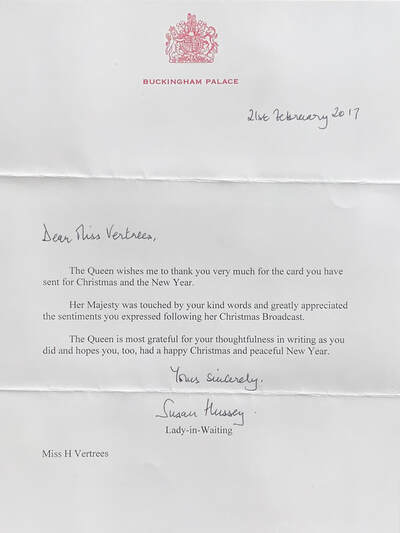 Maybe your children will get a reply when they write to someone. Receiving special mail can be so exciting for both young and adults. Maybe they want to send a special note along to a group that you support with charity. Maybe they want to write to someone who is a shut-in or is in the hospital or a recovery center. Certainly, they can write thank you notes to those who have given them Christmas presents.  Three... What goals and accomplishments do they want for the coming year? Writing down our goals and hopes for the new year can be powerful. People report that we are more likely to accomplish our goals if we have put them in writing. You can guide young writers in your life to think about their goals and hopes for the coming year, and organize them to be spread on a calendar, so they have a good idea of when to start working toward each goal and how long it might take to work on it. They can begin to write down steps they need to take to reach these goals. Here are some suggested categories for writing annual goals-- 1. Pray for God’s guidance before writing. John 15:5 “I am the vine, ye are the branches: He that abideth in me, and I in him, the same bringeth forth much fruit: for without me ye can do nothing.” (KJV) 2. Reread any previous annual plans for 2022 or the year-end letter I have suggested. 3. Plan achievements for hobbies/sports/clubs. 4. Build ideas for stronger relationships with family/friends. 5. Faith growth…Establish daily/weekly routines for prayer, church, Bible reading, memorizing Bible verses, and Christian youth groups. (Biblebee.org has great programs for youth to memorize Bible verses. Click here for details.) 6. List books to read. (Reading helps make better writers.) 7. List skills to learn…such as swimming, playing a musical instrument, fishing, model building, furniture restoring, baby-sitting, gardening. (Click here for a blog post I wrote for how to start gardening.) 8. List outdoor aspirations…such as camping, hiking, and cycling. 9. List places and people to visit. I suggest you build in weekly and monthly intentional review times to see how they are progressing. This should be written into the 2023-year plan. I want to encourage that these review times be ones with prayer, and perhaps your young writers can keep a prayer journal as they share with God their progress, and try to listen to His guiding as to how they should continue and maybe even modify some steps and aspirations. Psalms 32:8 “I will instruct thee and teach thee in the way which thou shalt go: I will guide thee with mine eye.” (KJV) I hope these suggestions bring all of you joy in your lives, and the lives of the children and teens you know. At this time last year when I wrote my goals for 2022, I included two personal goals—to travel to Colorado and visit my family there (Covid-19 issues had blocked that dream for three years), and to arrange my time and technology to listen to more audiobooks. (Thank you to my friend, Crystal Daye, dayelightpublishers.com, for providing her annual planner.) I truly think that by penning these aspirations, I made sure to fulfill them. I am so glad that I did. As you wrap up your year and look to the next, I hope you also find some special dreams and hopes that become a sweet reality in your lives in 2023. You may want to write them down. 😊 Merry Christmas, Heidi Vertrees Author/Educator Victor Survives Being a Kid newSongpress.net If you would like to receive more of these blog posts, to inspire you with your teaching children, please click HERE. Thank you for being a part of this journey, with the love of Jesus. Please see last month’s blog post about a special writing contest being offered for children and teens. Deadline for entries is March 1, 2023. Click HERE for details. Are you looking for a Christmas gift for a boy or girl ages 8-12? Victor Survives Being a Kid is a heartwarming adventure book sure to please. Available on Amazon at a special holiday price. Click here to order a copy.
If your children or students are bored with writing a clear-cut “How-to” assignment, here’s a twist—let them write it in story or visual format with their personal commentaries. In keeping with the mission of the newSongpress.net, young authors also are encouraged to write with a Christian perspective. This blog post will present information to help young writers with writing how-to expository writing, with one example from learning an athletic skill and the other from hands-on furniture restoration. Plus, through March 1, 2023, there will be a contest. See the end of this blog post for details. First-- Many children and teens like to write stories Here’s a way to give their stories some structure… Jesus often taught in parables. Throughout time, people have loved to hear stories, and it can be another great way to teach readers how to do things well. Plus, your children or students may want to add inspiring or inquiring words to share their faith in their stories. Here’s an example you can share in teaching this approach-- The sound of the whistle pierced the air. Olivia shot from the platform and into the pool. Dan dove in the lane next to Olivia's and whipped out dolphin kicks. The other racers joined in their own lanes, all face down. In seconds they worked the flutter kick, like machines in constant motion. Toes pointed. Legs straight. Power came from hips wobbling back and forth and legs rising and lowering fast. Power came from their arms, too, as they pulled them back through the water, one at a time. Quick side breaths were caught, in rhythm with the arms, for most, on the right arm reach. Next, each swimmer blew bubbles into the water, chin tucked, and reached forward with the other arm, thumb angled slightly downward, till the hand sliced the water. An extra stretch of the leading arm rolled the shoulder, keeping the swimmer streamlined, like a fish. Each time Olivia pulled her arm back under the water, she scooped water with her hand, fast, fast, to get it out of her way. Then she rammed her bent elbow up out into the air, cleared her arm from the drag of the water and reached forward again for another watery slice. No time to look at others. No time to pause, but in her brain, Olivia pleaded with God to give her strength. Words from Isaiah 12:2 lit her mind…the LORD is my strength and my song… The shouts from the crowd on the side bleachers reverberated against the walls. Tick, tick, tick. Dan flip turned first when he reached the far end of the pool. Before any bubbles could pop, Olivia flip turned. Her feet shoved off the wall. Think skills. Think skills. Everyone splashed and glided through the refreshing water to claim the 50-yard finish line. Olivia and Dan led the pack. Then they both stretched an arm to touch the other end of the pool at the same second. Astonished, they laughed and slapped a high five. Olivia squeezed her eyes for a quick prayer of thanks. To get started… Your children/students can make a list of things they enjoy doing and know very well. For instance, walking a dog, setting up a tent, cooking, or riding a bicycle. In my story, I captured the steps for swimming the front crawl, as some call it, freestyle. My challenge to your writers is to first think, picture, and then write the steps of how to do something and then turn it into a story. Did you notice that the story format caught your attention, but when I switched into expository writing to explain, the action was gone! Maybe you even noticed a slowdown in your interest? Jesus knew people LOVE stories. He taught with many parables, which are short stories that teach a lesson or religious principle, such as the story of the Good Samaritan. Jesus used this story to help us learn about God’s awesome love for all of us. Through the powerful messages in this story, we also learn how to care for and help each other. Parents and teachers, you can tell the young people in your lives, they don’t have to write a story every time to explain how to do something, but they can try it to see how their readers really pay attention to what they are teaching. Plus, they might have fun! They can even add in some humor, like-- My sheepdog stepped in the gooey, white glue I forgot to close and move out of the way. That may sound more interesting than just writing-- When you are done with the glue, make sure to close it and keep it safe. In my swim story, if a cut away from the action was desired, a funny antic by someone on the bleachers could be added. Your writers can also add in more details than I did, such as what their characters look like and say to each other. At the end of their how-to stories, writers can recap and list the important steps. Like a recipe format, list all the needed supplies. Then list the steps in the correct order for making their creations or completing their skills. (If your young writers are writing about their cooking projects, there are several kid-friendly recipes in Dig Deeper: a Discussion and Activity Guide for Victor Survives Being a Kid. It’s a free download and the recipes can show children and teens a format for writing their recipes. Click here if you want access to the free download. Also, at the end of this post I will refer to one of the recipes, from an earlier blog post.) My friend, Silvia Ferrara, had an excellent idea, especially for young children with big imaginations. Write how unicorns brush their teeth. Sounds like a fun picture book to me! Then, I recommend young writers list the steps they use for brushing their own teeth. One could even turn this into a compare and contrast with how a unicorn vs. the writers brush their teeth. Children do need to learn how to write compare and contrasts! 😊 Now perhaps your young writers want to turn their how-to assignments into something preposterous first, have some fun, and then add on a more serious version that pertains to their personal experience. Another story format is a personal anecdote, where the writer gives details of personal experience while creating a project or skill set. We often see this in videos on YouTube. Because we are seeking for our children/students to develop their writing skills, here is a personal anecdote approach for a how-to- on furniture restoration. It was created by Amber Hale, a multi-passionate entrepreneur who writes on her two blogs, is a health coach, a social media manager for businesses, and also enjoys thrifting vintage items for resale. This project may interest older youth and inspire them with their own creativity. They may also be motivated to sell their products or give them as gifts. May God bless your writing times with your children or students. May God’s love shine brightly on all your teaching, and may your young writers have much joy in sharing their How-to writing projects with family, friends, or classmates. This style of writing lends nicely for students to practice public speaking by presenting their own area of expertise with lots of hands-on items to show while they present. Who knows, maybe they will present their work on YouTube or another social media audience!
An important focus of new Song Press is to inspire Christian parents, teachers, and pastors to guide youth to be young authors. If your children/students are interested in starting a blog, you can go to kidslearntoblog.com to read about different programs such as Edublog and Kidblog. Your young authors also might like to query other bloggers about being a guest blogger on their websites. They can ask the bloggers for a copy of the guidelines so they will know the topics that are of interest to the blogger, the preferred length for a blog post, and other details. Now to learn about our… CONTEST From now through March 1, 2023 First, second, and third place winners plus honorable mentions We look forward to publishing parts of winning submissions in an upcoming blog post, so children and teens can have the joyful experience of being young Christian authors who are published. Send your How-to entry via Contact on newSongpress.net. You may also send a brief summary and you will be sent an email with instructions on how to send the complete version. Please include child/teens’ name and age in each entry. Enjoy! If you are not already a regular reader of these blog posts, I invite you to sign up for my email newsletter, to receive periodic blog announcements to help guide children and teens in their writing. Click here to do so. For the promised recipe for Fried Ice Cream and Caramel Sauce, click here. Blessings, Heidi Vertrees Author/Educator newSongpress.net Today, I want to share with you seven ways you can help your children or students transition from their summer vacations to embrace school writing assignments, by honoring prewriting as a powerful tool for writing. Too often children and teens are rushed to the “high board” by over-eager, short-on-time teachers and parents, and expected to jump into a writing assignment with little preparation for the topic. Letting students doodle briefly before writing, while you pray they are staying on topic, is not enough. Your children or students probably have some happy and exciting memories from their adventures this summer. However, I do not think most students want to be required to grind out an essay of what they did over the summer. Still, I do think they often want to remember their fun memories. Through prewriting, they can be inspired to share them creatively.
2. If they think it’s fun, let them audio record what they share. 3. Take time to look at any “touchstones” (memorabilia) from their recalled experiences this summer…brochures, photos, emails, posts, journal writing (if they accomplished this). Maybe revisit the location by seeing more on the Internet. 4. Then, as they are recalling, help them jot down keywords that they share. These keywords can be as a list or written inside ovals across a page where they can add subtopics as stems from the ovals. (webbing) 5. Prewriting is a fantastic time for enrichment. Children can be gently encouraged to share what they learned from their experiences as well as what they are wondering about. As part of their faith walk, they can be asked what they think Jesus wants them to learn from all of this. This pondering can again be recorded in keywords, to help them with their writing assignment. 6. Prewriting certainly can allow for drawing, coloring, or painting. Many children process their verbal ideas this way. 7. Some children may do well with a caring soul interviewing them. I suggest first writing a dozen or so key questions such as--
Before the interview, show this list to each child or teen to think about before starting the interview. You can audio record the session, or involve a peer or older student to record the answers so they also experience authentic writing with a purpose. If you are working with a group, each student can write his answers and then share them in a group before they start writing. Or students can be partners, taking turns interviewing each other, while the interviewer writes down key thoughts. Parents, I applaud you for all the positive, memorable experiences you have blessed your children with this summer. Honestly, they might be writing and talking about some of these memories for the rest of their lives. As their ideas bubble up, let them share. If they only want to write a poem or song this year, God may lead them to turn those memories into a play script another year. Whatever they choose to write about is special to them and can be kept sacred to their souls by letting them create their writing assignment format. The main thing is to embrace the experience, and then see how God wants to water that garden to grow. Last spring, I was involved in a town history day where children created sand paintings based on historical photos rallied up from the heyday when trollies zipped through our towns and hilly countryside. I can’t say the results of their artwork would have been much improved if their parents first took them to the nearby trolley museum or popped them on a restored trolley for a jolly ride, but certainly the project would take on a great deal more meaning for the children if they first were enriched by personal experiences with the project theme. Parents and teachers, thank you for all the “in the field” experiences you provide for children and teens in your lives.  Here is a fun way to celebrate with your children or students after they complete their writing assignment about their memorable summer experiences. Since it is still actually summer in the northern hemisphere till late September, I invite you to make Fried Ice Cream, using a kid-friendly recipe I wrote in my Teacher’s Guide for my book, Victor Survives Being a Kid. The Teacher’s Guide is available as a free download. You can click here. newSongpress.net/Victor. Scroll down that page to see the option. But here is the excerpt with the recipe. You may duplicate it for teaching purposes. Fried Ice Cream and Caramel Sauce Here’s a delicious dessert that will require working with a grownup’s help, especially when frying. It’s so yummy, but also requires patience since the ice cream needs time to freeze and refreeze. Either prep it one day and fry it the next, or start it at least 6-7 hours before eating. Please note: Before cooking, always read a recipe through so you can anticipate what ingredients and supplies you will need and so you make sure you understand all the steps and timing needed. Reading a recipe is a type of functional reading…reading that helps us learn how to do things…a very important type of reading to practice. Have fun! Enjoy! (Recipe inspired by recipes from Darlene Brenden, Jeri Zieman, and Villa Cocina.) Ingredients: 1 quart vanilla ice cream 3 cups crushed cornflakes cereal or 2 cups each crushed cornflakes cereal and sweetened shredded coconut finely chopped 1 tsp. cinnamon 3 egg whites or 2-3 eggs or 1/4 cup heavy whipping cream 2 tsp. vanilla 2 cups canola oil or other preferred oil, enough for partial emerging and stirring 1-2 balls at a time Optional Toppings: whipped cream, slices of banana, strawberries, cherries, chocolate or caramel sauce, colored sprinkles For Caramel Sauce: 1 cup sugar ½ cup butter, cubed ½ cup evaporated milk Directions:
Read and follow these cautions before frying with hot oil: Work carefully with an adult. Have lid for fryer or heavy saucepan. Kitchen should have fire extinguisher. (Note: Never use water to put out a fire caused by cooking oil. Put lid on fryer or pot to reduce fire. Baking soda puts out oil fires too.) When the hot oil is not needed, cover the pot and put away from heat source.
For Caramel Sauce:
I recently led a Writing Workshop for students from F.I.S.H. Hagerstown, a Maryland Christian homeschool group. One parent said in regard to her son, "It was a game changer for his writing." Another parent wrote, "They loved the creative aspect, with learning how to incorporate Jesus and their faith into their stories...They were encouraged by seeing others engaged and interested in writing." Another mom wrote, "You helped my oldest break through his writing block and get excited about writing again." I love to encourage and support children in their writing. In this blog, I am thrilled to now introduce you to one of our budding authors and share the story she wrote during our five workshops...
Rights and Wrongs |
| About Heidi Vertrees author/educator God has blessed me with many opportunities to teach hundreds of children, as a teacher in public and private schools, in churches, and as a mom, homeschool teacher, workshop and camp leader, Bible club leader, and swimming instructor. I am a licensed teacher, earned a BS in Journalism with Honors from the University of Colorado and a MPA from the University of Denver. I have written articles, short creative writing assignments, and curricula for multiple national and international publications. Victor Survives Being a Kid is my first novel. I wrote Victor Survives Being a Kid to help children experience God, good humor and courage, and the love of family even while going through major changes. It’s a high adventure novel particularly for boys and girls ages 9-12, is set in Colorado, and told through the eyes of Victor Ortega when he is in middle school, looking back over his fifth-grade year. Children delight in the Spanish (with translations) sprinkled in the story. A free, in-depth teacher’s guide is available (complete with Q&A, talking points, research and project ideas, and recipes) on newSongpress.net. |

I pray this article will bless you and the children and teens you teach by helping all of you discover more faith, hope, and love in ways to pray to our Creator God. Dear parents, teachers, and pastors, may your journey to bless and guide children, even in their developing writing skills, bear much fruit. I can hear my sweet mother saying the famous expression, “The pen is mightier than the sword.” How about, “The Word is mightier than the sword, especially since the Sword of the Spirit is the Word of God. Since God is Holy, Sovereign, Love, and our Creator, we do best to seek God in prayer and in His Holy Word before we start “attacking” all our problems and endeavors, including writing, right?
“Seek ye first the kingdom of God and His righteousness, and all these things will be added unto you. Sing Hallelu, Hallelujah.” This beautiful song can empower you as you prepare to teach children.
So how do we teach a “seek God first” habit in our students and children?
Make sure they learn the secret of how to do their BEST writing, and that is to seek God first! Teach them their loving God cares about their writing and He can help them.
As for God, His way is perfect: The LORD’s word is flawless; He shields all who take refuge in Him. (Psalm 18:30 NIV)
So, what do you say to the young writers who say, “But I just want to write about my new puppy or my dream vacation!” Let them know God is “all about” their new puppy and dream vacation, and He can also help them with the best words and ways to tell others about them in their writing.
Children are much more likely to pray when they know some of the basic building blocks of prayer. Here are 3 steps to guide your child in prayer:
- First building block--Praise God. This is how we start our church services, so many children can connect with this.
- Second building block--Seek God’s forgiveness. God wants us to be humble, and in our weakness is His strength. Teach your children that God will cleanse them and prepare them to be better messengers of the Good News. Though your sins are like scarlet, I will make them as white as snow. (Isaiah 1:18, NLT) After we confess our sins to God, He cleanses us and because of His great love, He forgets about those sins. He wants us to be renewed and ready to run the race He sets before us.
- Third building block--Ask. God wants to hear our requests. If we turn to Him, He knows we trust Him. Since He is our loving, Creator God, that makes Him happy! Requests can include asking for His help in our writing. Your students might also want to include prayer requests for those who will read their writing and how it may bless them.
- Fourth building block--Thank Him with deep and heartfelt gratitude. Teach children to become aware of how God has and is continuing to help them and those whom they care about. God knows we will have more peace in our souls when we have grateful hearts. He loves us and wants us to know this peace.
As in the children’s praise song “Christ Redeemed Us” (from Child Evangelism Fellowship, we have so much to be thankful about--foremost God sending His Son to be our Redeemer. What a joyful promise He has given us!
Use these prayer blocks to guide prayer but be careful to keep prayers fresh and alive for children.
To help children and youth picture these building blocks for prayer, have them imagine going before a king with their requests. Wouldn’t they first want to show respect to the king and act humbly? After their requests were presented, wouldn’t they want to thank the king? Jesus is the King of all kings. Even the order of worship for many churches is modeled like these prayer blocks. We can think of an entire church service as one giant prayer. 😊
Choose joy!
Praying first thing in the morning, three times per day before meals, and just before going to sleep are important daily moments for children and teens to learn to do. Building a strong family or group is beautifully done by praying before each meal. God is our Provider, and we need to thank Him for all things good including our nourishment. Frequently praying to our heavenly Father can help our children learn much joy. Since God wants a loving relationship with us, prayer is a key way to build that relationship.
When at the beach, I love walking along the seashore and admiring creative sandcastles. To get the sand wet enough for molding, one needs to be daringly close to the waves which ultimately in high tide sweep over those glistening castles and wash them away. Scripture says to build our homes on the Rock. That’s Jesus and with Him we will have a firm foundation that doesn’t wash away. (Matthew 7:24-27)
Jesus taught that the two greatest commandments are--Love God with all our hearts, souls, and minds, and love our neighbors as ourselves. (Matthew 22:37-39)
When we write, we are writing to an audience. Even if it’s scribbling in a diary, God is there. As I write, I try to picture my readers and write words of thoughtful help.
Children and adults can learn much from the short video, “The Meaning of ‘Strength’ in Hebrew,” produced by pursueGod.org, on loving God with all our mind and strength. I highly recommend it.
In the words of St. Richard of Chichester, “…O most merciful Redeemer, Friend and Brother, may I know Thee more clearly, love Thee more dearly, and follow Thee more nearly, day by day.”
May the children and teens in your lives come to cherish faith, hope, and love through a richer prayer life,
Soli Deo Gloria,
Heidi Vertrees
Author/Educator
P.S. See below for a free activity guide for kids. Also, please go to CONTACT if you would like to receive these blog posts via email.
- When we go on a trip, we should start with a full tank of gas. Teach your children that likewise we should start each day with prayer, so we can “drive” well each day. Might call it “Joy Fuel,” to be joy-full!
- On a big trip we also usually stop midway in the day to check the car. Great time to pray, too! At midday review that morning’s events and gear up for what lies ahead for that day. Scripture says we should take one day at a time. Let’s teach this wise practice of focusing intently on God’s gift of the present.
- When we park our car at night, we should check it again. Nighttime “check-in” prayer with God is a great practice too. For children, this is an important time for parents to reassure them of a loving God in whom they can trust, as they prepare for sleep and rest.
Praying first thing in the morning, three times per day before meals, and just before going to sleep are important daily moments for children and teens to learn to do. Building a strong family or group is beautifully done by praying before each meal. God is our Provider, and we need to thank Him for all things good including our nourishment. Frequently praying to our heavenly Father can help our children learn much joy. Since God wants a loving relationship with us, prayer is a key way to build that relationship.
When at the beach, I love walking along the seashore and admiring creative sandcastles. To get the sand wet enough for molding, one needs to be daringly close to the waves which ultimately in high tide sweep over those glistening castles and wash them away. Scripture says to build our homes on the Rock. That’s Jesus and with Him we will have a firm foundation that doesn’t wash away. (Matthew 7:24-27)
Jesus taught that the two greatest commandments are--Love God with all our hearts, souls, and minds, and love our neighbors as ourselves. (Matthew 22:37-39)
When we write, we are writing to an audience. Even if it’s scribbling in a diary, God is there. As I write, I try to picture my readers and write words of thoughtful help.
- When teaching children and teens the two greatest commandments, help them see the core: LOVE. Children may ask, How? How do we learn to love God and those around us?
- Through prayers children can begin to see God’s wondrous love for them in their lives. They can learn to trust God and know Him better. This builds their love for God and empowers them to have a sense of purpose and self-worth which makes it possible for them to love others.
- As children and teens grow in this beauty of the LORD, they can more aptly shape their writing to be enriched by God’s love and power in their lives.
Children and adults can learn much from the short video, “The Meaning of ‘Strength’ in Hebrew,” produced by pursueGod.org, on loving God with all our mind and strength. I highly recommend it.
In the words of St. Richard of Chichester, “…O most merciful Redeemer, Friend and Brother, may I know Thee more clearly, love Thee more dearly, and follow Thee more nearly, day by day.”
May the children and teens in your lives come to cherish faith, hope, and love through a richer prayer life,
Soli Deo Gloria,
Heidi Vertrees
Author/Educator
P.S. See below for a free activity guide for kids. Also, please go to CONTACT if you would like to receive these blog posts via email.
| About Heidi Vertrees author/educator God has blessed me with many opportunities to teach hundreds of children, as a teacher in public and private schools, in churches, and as a mom, homeschool teacher, workshop and camp leader, Bible club leader, and swimming instructor. I am a licensed teacher, earned a BS in Journalism with Honors from the University of Colorado and a MPA from the University of Denver. I have written articles, short creative writing assignments, and curricula for multiple national and international publications. Victor Survives Being a Kid is my first novel. I wrote Victor Survives Being a Kid to help children experience God, good humor and courage, and the love of family even while going through major changes. It’s a high adventure novel particularly for boys and girls ages 9-12, is set in Colorado, and told through the eyes of Victor Ortega when he is in middle school, looking back over his fifth-grade year. Children delight in the Spanish (with translations) sprinkled in the story. A free, in-depth teacher’s guide is available (complete with Q&A, talking points, research and project ideas, and recipes) on newSongpress.net. |

“Where there is love, there is God.” –Leo Tolstoy
With Valentine’s Day almost here, we can count our blessings because of those whom we love. In some countries, such as Mexico, it’s also a time to celebrate our families. Whether you are honoring friends or family on Valentine’s Day,
I want to give honor to you as a parent and/or teacher of children and teens. Thank you for all the times you count to ten silently and forge ahead with the right things to do for the young people in your lives! Your love and constructive guidance are certainly appreciated by our Heavenly Father and most likely by your young ones, too. Please be encouraged to keep going with the good graces of God! Your wise teachings make such a difference as your children grow, and please take comfort in knowing that when they are adults, they can also claim a grateful understanding when they look back on how you taught them.
God has blessed me with many opportunities to teach hundreds of children, as a teacher in public and private schools, in churches, and as a mom, homeschool teacher, workshop and camp leader, Bible club leader, and swimming instructor.
I have had the added pleasure of getting to know children from different cultures and socioeconomic levels, as I have lived in New York, Colorado, the Philippines, Germany, Chile, Tennessee, Virginia, and Maryland, as well as traveled far and wide throughout our wondrous world. All the while, I have had a heart for Jesus and a heart for children.
NewSong Press can help parents and teachers guide tweens and teens to write with a Christian worldview that is personal and true for them.
I invite you to come along as we build the NewSong Press ministry to help children and teens write with a Christian worldview. Future blog posts are to help assist you in writing techniques, to enrich your teaching both nonfiction and fiction writing skills to young, budding authors as well as those children and teens who secretly want to discover that writing doesn’t have to be a grind!
My journalism training (BS with Honors, from the University of Colorado) has bounced me into many successful nonfiction writing and editing jobs with magazines, journals, and curricula publishers. My recently released fiction book for tweens, Victor Survives Being a Kid, has earned an international book award. For many years, my classroom experience as a teacher has given me great opportunities to help children with their writing.
To help you in teaching language arts (reading and writing) to your children or students, I am available for in-person and virtual workshops, presentations, and podcast and radio interviews. Recently I presented Writing Tips for Teens at a Christian teen writers conference (done virtually) and was interviewed by Cynthia L. Simmons on “The Heart of the Matter” on how to help children with adjusting to big changes. This program is scheduled to be aired starting March 3, 2022. This spring I will be teaching in-person Writers’ Workshops to homeschoolers ages 10- up. In 2021, through the Washington county, Maryland public library system I led Meet the Author workshops.
Also, in 2021 I team led LightLab Church Camp Facebook live presentations for children, one of which is on YouTube—Lightlab Church Camp July 5, 2021. We also had in person hands-on science lessons with Bible lessons to explore the nature of light and how Jesus is the Light of the World. (See lightlabetc.com for more information about this awesome program and book you can use with children.)
I wrote Victor Survives Being a Kid to help children experience God, good humor and courage, and the love of family even while going through major changes.
It’s a high adventure novel particularly for boys and girls ages 9-12, is set in Colorado, and told through the eyes of Victor Ortega when he is in middle school, looking back over his fifth-grade year. Children delight in the Spanish (with translations) sprinkled in the story. A free, in-depth activity and discussion guide for Victor Survives Being a Kid is also available on newSongpress.net. The paperback and eBook for Victor Survives Being a Kid is available on Amazon, Barnes & Noble, and Christianbook.com.
As Apostle Paul said in Romans 8:38-39, nothing can separate us from the love of God in Christ Jesus our Lord…neither height, nor depth… When I stood on the support bar of a small airplane wing, ready to jump with my parachute, God, in His infinite love was there. When I stared at a large black-tip reef shark one hundred feet deep while scuba diving in Mexico, God was there, too.
Maybe you are going through some mind-numbing, scary times as you muster the courage to teach and lead the children in your lives. God, in His infinite love, is with you no matter where you are. As said in Isaiah 41:10 “Fear thou not; for I am with thee: be not dismayed; for I am thy God: I will strengthen thee; yea, I will help thee; yea, I will uphold thee with the right hand of my righteousness.” (KJV)
It is my prayer that you know this powerful love from God as you live each day and celebrate St. Valentine’s Day.
NewSong Press can be a source for you as you guide and help young people to improve their writing in ways that can bless them and others.
Please feel welcome to contact me via my contact form if I can help you further and may you be blessed by future blog posts on this site to help and support you with your teaching language arts to children and teens.
With Valentine’s Day almost here, we can count our blessings because of those whom we love. In some countries, such as Mexico, it’s also a time to celebrate our families. Whether you are honoring friends or family on Valentine’s Day,
I want to give honor to you as a parent and/or teacher of children and teens. Thank you for all the times you count to ten silently and forge ahead with the right things to do for the young people in your lives! Your love and constructive guidance are certainly appreciated by our Heavenly Father and most likely by your young ones, too. Please be encouraged to keep going with the good graces of God! Your wise teachings make such a difference as your children grow, and please take comfort in knowing that when they are adults, they can also claim a grateful understanding when they look back on how you taught them.
God has blessed me with many opportunities to teach hundreds of children, as a teacher in public and private schools, in churches, and as a mom, homeschool teacher, workshop and camp leader, Bible club leader, and swimming instructor.
I have had the added pleasure of getting to know children from different cultures and socioeconomic levels, as I have lived in New York, Colorado, the Philippines, Germany, Chile, Tennessee, Virginia, and Maryland, as well as traveled far and wide throughout our wondrous world. All the while, I have had a heart for Jesus and a heart for children.
NewSong Press can help parents and teachers guide tweens and teens to write with a Christian worldview that is personal and true for them.
I invite you to come along as we build the NewSong Press ministry to help children and teens write with a Christian worldview. Future blog posts are to help assist you in writing techniques, to enrich your teaching both nonfiction and fiction writing skills to young, budding authors as well as those children and teens who secretly want to discover that writing doesn’t have to be a grind!
My journalism training (BS with Honors, from the University of Colorado) has bounced me into many successful nonfiction writing and editing jobs with magazines, journals, and curricula publishers. My recently released fiction book for tweens, Victor Survives Being a Kid, has earned an international book award. For many years, my classroom experience as a teacher has given me great opportunities to help children with their writing.
To help you in teaching language arts (reading and writing) to your children or students, I am available for in-person and virtual workshops, presentations, and podcast and radio interviews. Recently I presented Writing Tips for Teens at a Christian teen writers conference (done virtually) and was interviewed by Cynthia L. Simmons on “The Heart of the Matter” on how to help children with adjusting to big changes. This program is scheduled to be aired starting March 3, 2022. This spring I will be teaching in-person Writers’ Workshops to homeschoolers ages 10- up. In 2021, through the Washington county, Maryland public library system I led Meet the Author workshops.
Also, in 2021 I team led LightLab Church Camp Facebook live presentations for children, one of which is on YouTube—Lightlab Church Camp July 5, 2021. We also had in person hands-on science lessons with Bible lessons to explore the nature of light and how Jesus is the Light of the World. (See lightlabetc.com for more information about this awesome program and book you can use with children.)
I wrote Victor Survives Being a Kid to help children experience God, good humor and courage, and the love of family even while going through major changes.
It’s a high adventure novel particularly for boys and girls ages 9-12, is set in Colorado, and told through the eyes of Victor Ortega when he is in middle school, looking back over his fifth-grade year. Children delight in the Spanish (with translations) sprinkled in the story. A free, in-depth activity and discussion guide for Victor Survives Being a Kid is also available on newSongpress.net. The paperback and eBook for Victor Survives Being a Kid is available on Amazon, Barnes & Noble, and Christianbook.com.
As Apostle Paul said in Romans 8:38-39, nothing can separate us from the love of God in Christ Jesus our Lord…neither height, nor depth… When I stood on the support bar of a small airplane wing, ready to jump with my parachute, God, in His infinite love was there. When I stared at a large black-tip reef shark one hundred feet deep while scuba diving in Mexico, God was there, too.
Maybe you are going through some mind-numbing, scary times as you muster the courage to teach and lead the children in your lives. God, in His infinite love, is with you no matter where you are. As said in Isaiah 41:10 “Fear thou not; for I am with thee: be not dismayed; for I am thy God: I will strengthen thee; yea, I will help thee; yea, I will uphold thee with the right hand of my righteousness.” (KJV)
It is my prayer that you know this powerful love from God as you live each day and celebrate St. Valentine’s Day.
NewSong Press can be a source for you as you guide and help young people to improve their writing in ways that can bless them and others.
Please feel welcome to contact me via my contact form if I can help you further and may you be blessed by future blog posts on this site to help and support you with your teaching language arts to children and teens.

Are you starting your new year with “Walk on Water” faith in Jesus? This is a great time to think about your hopes and dreams and goals for 2022. It may help you to look over your accomplishments in the past year. Did you set goals then? Which ones were you able to achieve? If they changed, did any of them change for the better? I invite you to use this time to write lists to guide you for the coming year in which God will bless you.
When Jesus walked on water it was windy and dark. (You can read about it in the book of Matthew, the first book in the New Testament, chapter 14, verses 22-33.) Jesus’ apostles were afraid in their boat, and they weren’t sure Jesus was out there on that water. Sometimes our days are windy and dark. But, Jesus is and was out there, as our light and as our guide.
Jesus called to Peter, “Come!” Peter offered to do that if it really was Jesus. That kind of faith… “Walk on Water” faith, requires our whole being stepping out into the unknown, as long as it leads to Jesus. We can’t just step out by only thinking about it, or longing for it. We have to do it! And, as long as Peter was not afraid, he was walking on water!
Now, as a certified swim instructor, I am certainly not suggesting we try to walk on water. This is a Bible lesson special to Peter and Jesus in that way. But we can still learn big lessons from this amazing miracle.
Jesus wasn’t going to let Peter sink when Peter got afraid. And Jesus will help us when we get afraid. He reached his hand to Peter and he will reach his hand to us. But he said to Peter, why did you doubt? Jesus does not want us to doubt or be afraid in following Him. He wants us to fully believe, with our whole mind, body, and soul.
So, as you begin this new year, embrace this into your hopes and dreams and goals. Find and memorize Scripture verses to help you, and memorize and sing praise songs to guide you through your days as you work on your goals. Find good Christian mentors who can help you, too.
Keep a journal where you can write every day how Jesus is helping you with your accomplishments. Stay in prayer and be ready to confess to Him any of your fears and worries. He will cleanse you and help you. He will strengthen you. I hope you have a great year of “Walk on Water” faith with Jesus as your rescuer-Savior, loving Shepherd, Messiah-King, and Almighty God. May God the Father, God the Son, and God the Holy Spirit bless you!
When Jesus walked on water it was windy and dark. (You can read about it in the book of Matthew, the first book in the New Testament, chapter 14, verses 22-33.) Jesus’ apostles were afraid in their boat, and they weren’t sure Jesus was out there on that water. Sometimes our days are windy and dark. But, Jesus is and was out there, as our light and as our guide.
Jesus called to Peter, “Come!” Peter offered to do that if it really was Jesus. That kind of faith… “Walk on Water” faith, requires our whole being stepping out into the unknown, as long as it leads to Jesus. We can’t just step out by only thinking about it, or longing for it. We have to do it! And, as long as Peter was not afraid, he was walking on water!
Now, as a certified swim instructor, I am certainly not suggesting we try to walk on water. This is a Bible lesson special to Peter and Jesus in that way. But we can still learn big lessons from this amazing miracle.
Jesus wasn’t going to let Peter sink when Peter got afraid. And Jesus will help us when we get afraid. He reached his hand to Peter and he will reach his hand to us. But he said to Peter, why did you doubt? Jesus does not want us to doubt or be afraid in following Him. He wants us to fully believe, with our whole mind, body, and soul.
So, as you begin this new year, embrace this into your hopes and dreams and goals. Find and memorize Scripture verses to help you, and memorize and sing praise songs to guide you through your days as you work on your goals. Find good Christian mentors who can help you, too.
Keep a journal where you can write every day how Jesus is helping you with your accomplishments. Stay in prayer and be ready to confess to Him any of your fears and worries. He will cleanse you and help you. He will strengthen you. I hope you have a great year of “Walk on Water” faith with Jesus as your rescuer-Savior, loving Shepherd, Messiah-King, and Almighty God. May God the Father, God the Son, and God the Holy Spirit bless you!
Many blessings in your writing!
Heidi Vertrees
Author Educator
Heidi Vertrees
Author Educator
Have you read my new book Victor Survives Being a Kid? If not, ask an adult to learn more about it with you by visiting my book page HERE!
Emblazoned Across Her Car
As soon as I climbed out of my vintage Montego-blue Miata, and smelled late December rain, my eyes caught the large white lettering spread clear across the side of the maroon SUV next to me--Christ is King. Who could miss this great encouragement? My tooth ached and I soon would be tilted back in the dentist’s chair, but this car made me actually eager to go in the dentist’s office. Whose car was it?
The waiting room was typical 2021 for small town Boonsboro in the Maryland Appalachian highlands. Half a dozen of us sat in a circle, suited up with our masks. Not a peep. Polite. Minding our own business. But I knew someone behind these mystery masks had to have a strong faith. So, as a sometimes-unreformed New Yorker, I broke the silence.
“So, who has the car that says Christ is King in big lettering? It looks great!”
The waiting room was typical 2021 for small town Boonsboro in the Maryland Appalachian highlands. Half a dozen of us sat in a circle, suited up with our masks. Not a peep. Polite. Minding our own business. But I knew someone behind these mystery masks had to have a strong faith. So, as a sometimes-unreformed New Yorker, I broke the silence.
“So, who has the car that says Christ is King in big lettering? It looks great!”
A much younger lady across from me smiled. These days we detect hidden, masked smiles when the eyes brighten and brim up from raised cheek muscles. “It’s mine.”
Then the intriguing story--
“I wouldn’t go out with this guy, so he keyed my car. Then I got the biggest Christ message I could find and put it across the scratches.”
Impressive! “I didn’t even notice the scratches.” Trust me, they are there; I checked later. Long, selfish, full-of-anger scratches. But the Christ is King message is healing the situation and stands out way bigger than any damage. He always does.
Then the intriguing story--
“I wouldn’t go out with this guy, so he keyed my car. Then I got the biggest Christ message I could find and put it across the scratches.”
Impressive! “I didn’t even notice the scratches.” Trust me, they are there; I checked later. Long, selfish, full-of-anger scratches. But the Christ is King message is healing the situation and stands out way bigger than any damage. He always does.
How about you? I bet you have a story to share. We all have a time we can share where Christ came and stood mighty as King in our tumult. Here are some tips to help you capture your thoughts in writing--
- Use an exciting title and opening sentence that grabs your readers’ attention.
- Make it clear from the start where and when your story is happening, and help your readers sense your special message or topic so they want to know more as they read along.
- Give sensory details to help your readers feel they are there with you in your telling. Draw them in by remembering to share how all your five senses came alive, as well as thoughts, questions, and perhaps quick prayers you had in those moments. Show your personality, which in writing is called Voice. Like snowflakes, God made us all different and dear, so let your readers see you. Don’t strain to be someone you are not. Instead, make your "faith walk" real for them.
- Pose questions and make statements that appeal to your readers. Aim to help them smile or feel deep chords playing in their souls.
Many blessing to you in your writing journey!
Heidi Vertrees
Author and Educator
Heidi Vertrees
Author and Educator
Have you read my new book Victor Survives Being a Kid? If not, ask an adult to learn more about it with you by visiting my book page HERE!
Have you read my new book Victor Survives Being a Kid? If not, ask an adult to learn more about it with you by visiting my book page HERE!
Archives
November 2023
September 2023
June 2023
May 2023
March 2023
February 2023
December 2022
November 2022
August 2022
July 2022
June 2022
March 2022
February 2022
January 2022
December 2021
Categories
All Christian Writing Prompts Christian Writing Prompt That Helps Kids See God's Love For Them Christian Writing Workshops Songwriting Prompts Students Writing With Strong Voice Teaching Reluctant Writers Writing-with-strong-voice




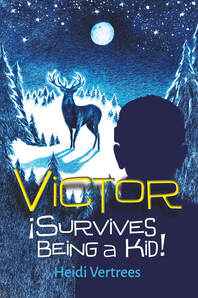



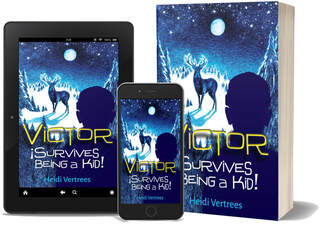
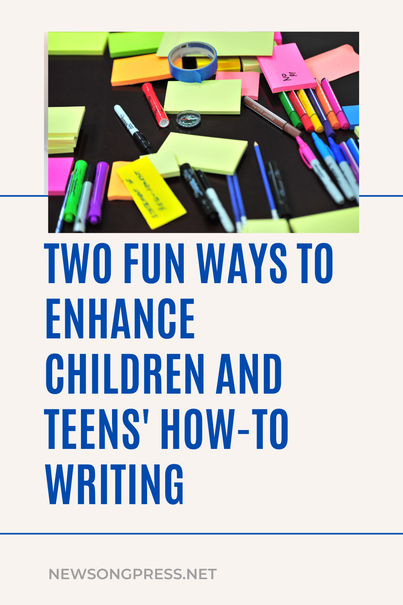



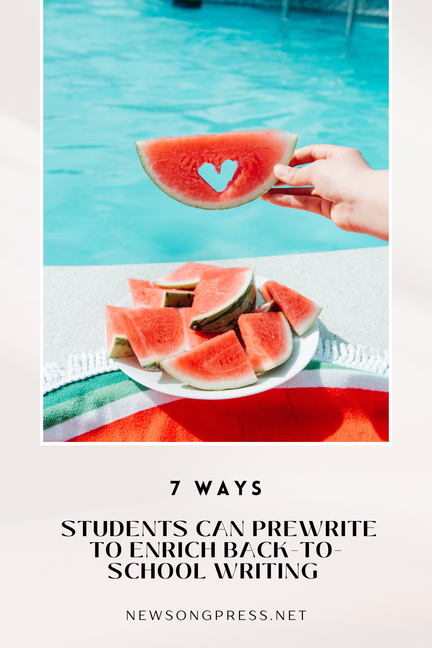




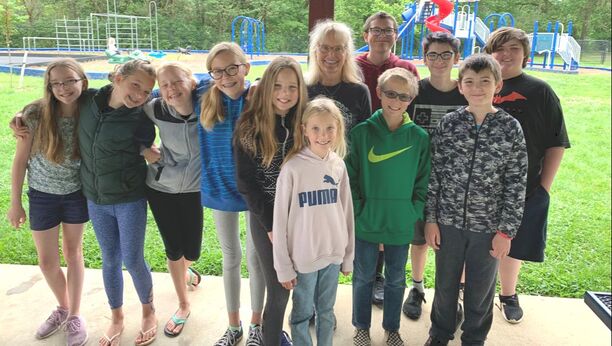
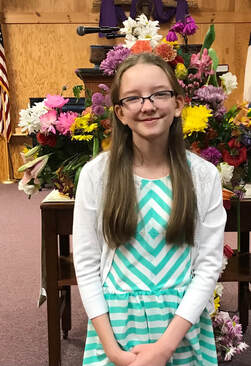








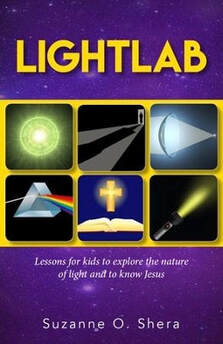
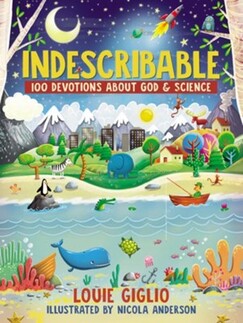





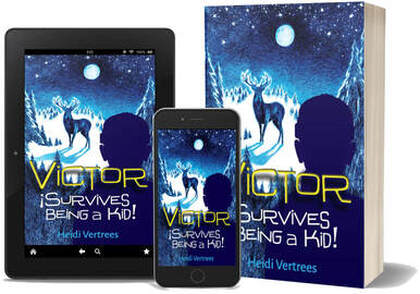



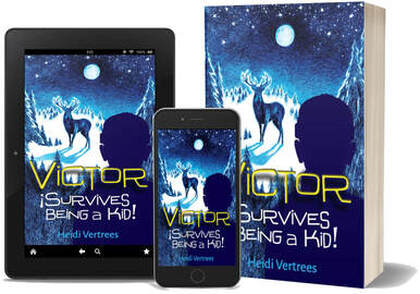




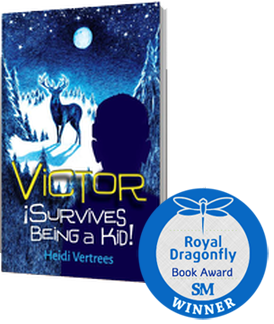



 RSS Feed
RSS Feed